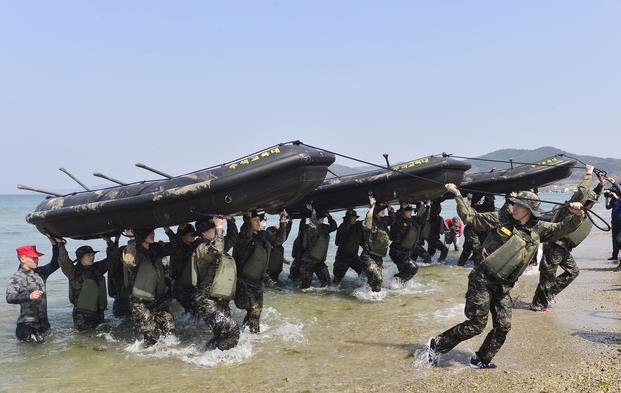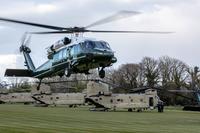SEOUL, South Korea — South Korea’s Olympic committee is pushing to send hundreds of athletes to a military training center to enhance their mental toughness for the Paris Olympics, a move that's been criticized as outdated and regressive.
The Korean Sport & Olympic Committee advised domestic associations last week to send athletes to the Korea Marine Corps camp in the southeastern port city of Pohang for three days of training this month, according to some associations.
About 320 athletes, including women, are expected at the boot camp, committee officials said on Thursday. Sports associations have previously asked their athletes to take marine-style training ahead of big sports events but it’s the first time the Olympic committee has recommended it, committee officials added.
Those officials reportedly decided on the camp following the Asian Games in China in October, when South Korea finished third in the gold medal count to China and Japan.
After the Asian Games, Olympic committee head Lee Kee-Heung floated the idea of marine camp training and said athletes would be joined by top committee officials including himself, according to South Korean media reports.
Messages slamming and deriding the Olympic committee plan flooded South Korean social media and internet sites.
“Are we still under the period of military rules?” read a message on X, formerly known as Twitter. Another X user said “they can just select marines with strong mental power as Olympic athletes,” while others called the Olympic committee’s plan “a comedy” or “out of mind.”
Details of the Dec. 18-20 camp in Pohang are still under discussion between the Olympic committee and the Korea Marine Corps. But previous pre-Olympic marine camp training involving fencers, wrestlers and handballers included rappelling courses, and carrying 140-kilogram (310-pound) inflatable boats on their heads together.
Reached by The Associated Press, South Korea’s wrestling and breakdancing associations said they won’t send their athletes to the marine camp because they have competitions when the training is scheduled.
Yukyoum Kim, a physical education professor at Seoul National University, said athletes can still learn something from marine training. The programs were developed not only by marine officers but also sports management and medicine professionals, Kim added.
“It is crucial to help the athletes overcome small and big hardships for their personal and teams’ growths,” Kim said. “Although it has involved forceful group camps and violence in the past, marine boot camp has played a rather effective role to achieve those goals.”
Big companies and schools have also sent employees and students to the marine camp and other military-run trainings.
South Korea has risen from war, poverty and military dictatorships to a cultural and economic powerhouse with a vibrant democracy. But many in South Korea still link successes in big sports events like the Olympics to national pride, and problems related to training culture have often been ignored as long as athletes succeeded.
Male athletes are exempted from 18-21 months of mandatory military service if they win gold medals at Asian Games and any medals at the Olympics.
___
Associated Press writer Hyung-jin Kim contributed to this report.











